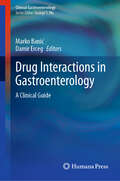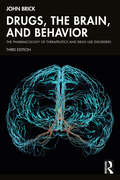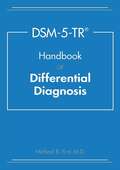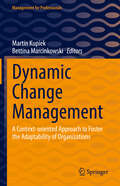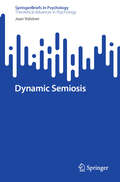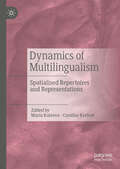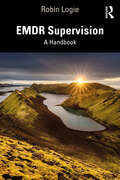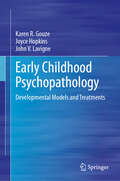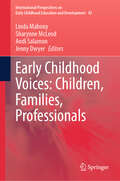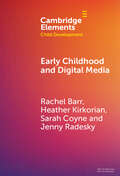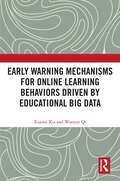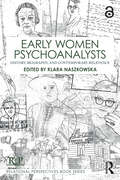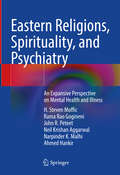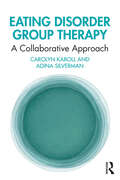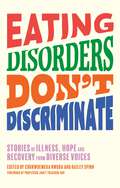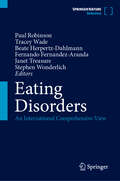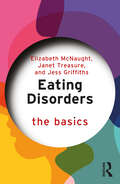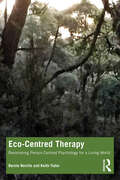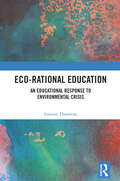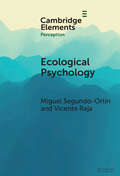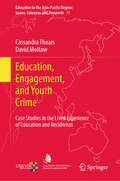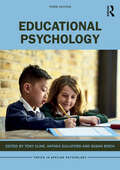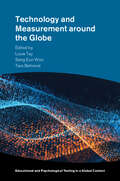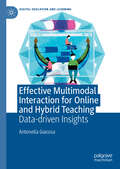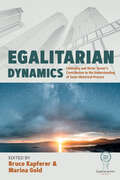- Table View
- List View
Drug Interactions in Gastroenterology: A Clinical Guide (Clinical Gastroenterology)
by Marko Banić Damir ErcegThe risk of clinically significant drug interaction rises when a patient increases his intake of medication. While drug interaction can be a prominent cause of illness, in many cases, it can be avoided with proper knowledge and care. This text provides a concise yet comprehensive review of common drug interactions in gastroenterology. The book begins with a preliminary overview of GI drugs, focusing on legal aspects of drug use, clinical research and regulatory review, and drug development. The next section goes over the basic pharmacology of GI drugs, specifically profiling antisecretory drugs, motility drugs, mucosal protective agents, antibiotics, and anti-inflammatory drugs. The third section of the text reviews important aspects of drug interaction; topics covered in this section include the different types of drug interactions, adverse drug reactions and interactions, enzymes and transporters involved in drug interactions, pharmacogenomics, drug-herbal interactions, drug-food interactions, and ways to avoid drug interactions altogether. The book moves on to examine comorbidity and digestive diseases that can result from drug interactions, with particular emphasis on infections, cardiorespiratory disorders, renal insufficiency, IBS, metabolic disorders, and CNS disorders. This section also discusses the influence of age on drug interactions. The final section spotlights comedication that can be used to mitigate disorders caused by drug interactions, specifically reviewing comedication used to treat acid-related disorders, intestinal inflammation, liver disorders, pancreato-biliary disorders, and motility disorders. The text also includes over 100 high-yield illustrations, photographs, and tables.
Drugs, the Brain, and Behavior: The Pharmacology of Therapeutics and Drug Use Disorders
by John BrickThis third edition of Drugs, the Brain, and Behavior provides a comprehensive overview of the brain and explores the clinical and pharmacological issues surrounding drug abuse and dependence.Dr Brick provides definitions, historic discoveries about the nervous system, and original, eye-catching illustrations to discuss the brain/behavior relationship, basic neuroanatomy, neurophysiology, and the mechanistic actions of mood-altering drugs. Topics include: how psychoactive drugs affect cognition, behavior, and emotion; the brain/behavior relationship; the specific effects of major addictive and psychoactive drug groups; new definitions and thinking about abuse and dependence; and the medical uses of drugs, such as cannabinoids. A new chapter on biobehavioral markers explores how markers can guide the clinician in the diagnosis of some disorders. This book offers a quick reference guide which uses a balance of instruction, illustrations, tables, and formulas, that will give you a broad, lasting introduction to this intriguing subject.Drugs, the Brain, and Behavior is an invaluable resource for students in the field, nurses, psychologists, counsellors, physicians and other health care professionals.
Dsm-5-tr® Handbook Of Differential Diagnosis
by Michael B. FirstThe DSM-5-TR Handbook of Differential Diagnosis is the preeminent guide to differential diagnosis for both clinicians and students learning psychiatric diagnosis. Fully updated to reflect the recent Diagnostic and Statistical Manual of Mental Disorders, Fifth Edition, Text Revision (DSM-5-TR), this handbook includes two newly developed diagnostic trees (for dissociative symptoms and repetitive pathological behaviors). This indispensable guide offers a rich selection of diagnostic lenses through which to consider symptomatic presentations, grounded in the latest research and standards of practice. Written by the DSM-5-TR Editor, an expert on psychiatric diagnosis and assessment, the handbook guides clinicians and students on how to differentiate between disorders with similar presentations in an accessible, easy-to-use format. An assortment of approaches to differential diagnosis and a number of features designed to benefit the evaluation include: • A six-step framework for diagnosing patients that proceeds from determining if the presenting symptoms are due to a substance/medication or a medical condition, to establishing the boundary between disorder and normality, to determining the primary disorder, and differentiating adjustment disorders from other mental disorders. • Thirty symptom-oriented decision trees, two of which are new to this edition, that provide detailed decision points to facilitate the process of generating the differential diagnosis based on the presenting symptoms and eliminate formulating premature conclusions. • Sixty-seven differential diagnosis tables, one for each of the most important disorders in DSM-5-TR, cross-referenced with the terminal branches of the decision trees presented in the handbook and that provide a head-to-head comparison of each disorder, highlighting similarities and differences. • The DSM-5-TR Classification, to facilitate coding and to provide an overview of all the DSM-5-TR diagnoses that must be considered in formulating a differential diagnosis. DSM-5-TR Handbook of Differential Diagnosis provides a comprehensive overview of the process of diagnosing DSM-5-TR disorders while serving as a reference guide to assist in the differential diagnosis of individual patients. Clinicians and students learning psychiatric diagnosis faced with this most crucial task will find this handbook of enormous benefit.
Dynamic Change Management: A Context-oriented Approach to Foster the Adaptability of Organizations (Management for Professionals)
by Martin Kupiek Bettina MarcinkowskiThis book offers a new perspective on change projects in organizations. While traditional approaches of analysis, planning, and implementation can be too slow and unsatisfactory in dynamic environments, this book introduces a context-oriented, dynamic approach that seamlessly integrates technology, processes, and people into the organizational framework. Drawing from organizational theory, it prioritizes both the formal and informal aspects of an organization's structure and culture, and emphasizes the emotional side of change. It provides practical guidance on using emotion concepts to facilitate change in a positive way, and covers key supporting technologies, communication strategies, and human resource considerations. In addition to describing the approach, the book provides helpful tips on selecting the right consultants and embedding change know-how for future initiatives. It is an indispensable resource for anyone leading a change project or looking to improve their organization's ability to adapt. So why settle for a traditional approach when you can achieve meaningful change through a dynamic, context-oriented approach?
Dynamic Semiosis (SpringerBriefs in Psychology)
by Jaan ValsinerThis book aims to bring to readers the author’s elaborated focus on the dynamic process of sign emergence, use, fixation and un-fixation, and dismissal. Its uniqueness is in its reliance on the organizing limits of irreversible time that renders the meaning construction by human beings to be constantly open-ended to face the uncertainties of the immediate future. This book emerged from a 9-month series of seminars at the Department of Semiotics at Tartu University in 2021-2022 as a Välis-Eesti Külalisprofessor, during which the linkages between semiotics and cultural psychology were scrutinized. In collaboration with doctoral students from various countries, the present SpringerBrief outlines the theoretical innovations that the author started during the seminars but completed in the two years after their end.
Dynamics of Multilingualism: Spatialised Repertoires and Representations
by Caroline Kerfoot Maria KuteevaThis edited book focuses on the ways in which contemporary societal challenges are constructed, mediated and lived through language and other semiotic modalities in new on- and off-line spaces. It conceives of linguistic repertoires as part of dynamic assemblages that can enable an understanding of the ways in which different bodies, lived experiences, discourses, semiotic resources, and objects intra-act, change and ‘become’ together in unpredictable ways. The chapters reveal the conditions under which such assemblages occur and the nature of the entangled elements that enable certain practices to emerge and then either to endure or disappear, drawing on a range of critical sociolinguistic and discourse analytical methods to explore how histories, languages, bodies, and the material realisation of each space intra-act in the production of determinations of (linguistic) legitimacy and worth, shaping contemporary ideologies of belonging and, thereby, other possibilities. This book will be of interest to students and researchers in fields including sociolinguistics, anthropology, migration studies, and education.
EMDR Supervision: A Handbook
by Robin LogieThis unique handbook provides a guide for supervisors of therapists who use Eye Movement Desensitisation and Reprocessing (EMDR) therapy, and those undergoing training in EMDR supervision. Whilst drawing on the literature on supervision theory and research, this book provides a down-to-earth guide to this topic, focusing on the European system of accreditation. The book guides the EMDR supervisor and supervisor-in-training in the difficult task of balancing the roles of educator, enabler, and evaluator. Using the author’s unique blend of warmth, humour, and humility, the book includes vignettes of real-life situations encountered by the author and provides practical solutions to dilemmas encountered in EMDR supervision.
Early Childhood Psychopathology: Developmental Models and Treatments
by Karen R. Gouze Joyce Hopkins John V. LavigneThis book examines psychosocial risk factors contributing to the development and maintenance of psychopathology in early childhood. It draws on developmental psychopathology theory and research to discuss different approaches to the classification of early childhood emotional and behavioral disorders, address the importance of multidomain approaches to understanding risk factors for specific diagnoses, and examine the movement toward transdiagnostic conceptualizations. The book describes how multidomain models of risk factors can be integrated with transdiagnostic approaches to illuminate the development of general psychopathology, internalizing and externalizing symptoms, and singular symptom clusters of the most common early childhood disorders, including oppositional disorders, ADHD, anxiety, and depression. In addition, the volume highlights the implications of this approach for clinical treatment, training of child clinicians, and the development of public policy. Key areas of coverage include: A developmental psychopathology approach to early childhood mental health disorders and the development of multi-domain models of risk factors. Risk factors contributing to the development and maintenance of emotional and behavioral symptoms in early childhood. Transdiagnostic approaches and risk factors for general psychopathology as well as specific types of symptoms. Current treatments for disorders in early childhood and a novel integrative approach to treatment based on research findings. Training of child clinicians and social policy implications derived from the research program detailed in the book. Early Childhood Psychopathology is an essential resource for researchers, clinicians, scientist-practitioners, and graduate students in such fields as developmental, clinical child, and school psychology, child and adolescent psychiatry, social work, family studies, early childhood education, and all related disciplines.
Early Childhood Voices: Children, Families, Professionals (International Perspectives on Early Childhood Education and Development #42)
by Andi Salamon Sharynne McLeod Linda Mahony Jenny DwyerThis revolutionary book explores theoretical and practical issues of listening to children, families, and professionals who advocate for and work with young children to promote social justice and improve their lives, and to ensure no one is left behind. Listening to children is explored across multiple disciplines internationally and highlights the practical application of the United Nations Sustainable Development Goals in the context of the Convention on the Rights of the Child. The work explores innovations, theories, and partnerships, and draws on the voices of children, families, early childhood educators, speech-language pathologists, and multidisciplinary teams from across 17 countries to provide a shared vision for equity, peace and justice for all while integrating social environmental, economic, and dimensions of sustainability. Topics include giving children a voice; methods for listening to and documenting young children’s perspectives; listening to and working in partnership with families, educators, and professionals; and wellness and wellbeing of young children and their families across multiple dimensions.
Early Childhood and Digital Media (Elements in Child Development)
by Rachel Barr Heather Kirkorian Sarah Coyne Jenny RadeskyScreen time, defined as estimates of child time spent with digital media, is considered harmful to very young children. At the same time, the use of digital media by children under five years of age has increased dramatically, and with the advent of mobile and streaming media can occur anywhere and at any time. Digital media has become an integral part of family life. Imprecise global screen time estimates do not capture multiple factors that shape family media ecology. In this Element, the authors discuss the need to shift the lens from screen time measures to measures of family media ecology, describe the new Dynamic, Relational, Ecological Approach to Media Effects Research (DREAMER) framework, and more comprehensive digital media assessments. The authors conclude this Element with a roadmap for future research using the DREAMER framework to better understand how digital media use is associated with child outcomes.
Early Warning Mechanisms for Online Learning Behaviors Driven by Educational Big Data
by Xiaona Xia Wanxue QiThe book aims to design and construct early warning mechanisms based on the dynamic temporal tracking technology for online learning behaviors, driven by educational big data.By studying a massive amount of learning behavior instances generated in various interactive learning environments worldwide, the book explores the continuous sequences of correlated learning behaviors and characteristics. From various angles, the authors have devised a series of early warning measures that could effectively solve multiple issues in learning behaviors driven by educational big data. Additionally, the book predicts patterns and identifies risks by analyzing the temporal sequences of the entire learning process. While presenting a range of theoretical achievements and technical solutions to improve and design new online learning mode, it also provides relevant technical ideas and methodologies for research on similar problems.The book will attract scholars and students working on learning analytics and educational big data worldwide.
Early Women Psychoanalysts: History, Biography, and Contemporary Relevance (ISSN)
by Klara NaszkowskaEach life story is unique, yet each also entwines with other stories, sharing recurring themes linked to issues of gender, Jewishness, women's education, politics, and migration.The book's first section discusses relatively known analysts such as Sabina Spielrein, Lou Andreas-Salomé, and Beata Rank, remembered largely as someone's wife, lover, or muse; and the second part sheds light on women such as Margarethe Hilferding, Tatiana Rosenthal, and Erzsébet Farkas, who took strong political stances. In the third section, the biographies of lesser-known analysts like Ludwika Karpińska-Woyczyńska, Nic Waal, Barbara Low, and Vilma Kovács are discussed in the context of their importance for the early Freudian movement; and in the final section, the lives of Eugenia Sokolnicka, Sophie Morgenstern, Alberta Szalita, and Olga Wermer are examined in relation to migration and exile, trauma, loss, and memory.With a clear focus upon the continued importance of these women for psychoanalytic theory and practice, as well as discussion that engages with pertinent issues such as gendered discrimination, inhumane immigration laws, and antisemitism, this book is an important reading for students, scholars, and practitioners of psychoanalysis, as well as those involved in gender and women's studies, and Jewish and Holocaust studies.
Eastern Religions, Spirituality, and Psychiatry: An Expansive Perspective on Mental Health and Illness
by H. Steven Moffic John R. Peteet Ahmed Hankir Neil Krishan Aggarwal Rama Rao Gogineni Narpinder K. MalhiThis book provides a thorough, comprehensive, and accessible reference for all the major Eastern faith traditions and their intersection with psychiatry. Understanding Eastern religion is of paramount value to all mental health professionals, as there is a growing emphasis on religion and spirituality as a part of clinical cultural competence interventions, predominantly in North America and Europe. Additionally, there is rising membership in Eastern, Asian, and non-Semitic faith traditions in North America and Europe. Hence, more patients and clinicians belong to these non-Western faiths than ever before. The volume is divided into five parts. Part 1 covers general issues, including principles of culture, religion, and spirituality in psychiatry, spirituality across the lifespan, child rearing, practice and faith, and how death and dying is approached in these Eastern traditions. Part 2 covers specific Eastern religions and spiritual traditions, including basic principles and research-based clinical aspects of Hinduism, Buddhism, Sikhism, Taoism, Zoroastrianism, Jainism, as well as Confucian philosophical ideas. Part 3 attempts to apply the importance of cultural humility to perspectives on the Eastern Traditions from Western Psychiatry. These include Christian, Muslim, and Jewish perspectives, not of expertise, but of explorations in learning. Part 4 covers specific social psychiatric perspectives, including the psychiatric harm that can come from caste divisions and cults posing as religions, but closes with a perspective on the Eastern connections to the relatively unknown, but unifying, Omnist perspective. All mental health professionals seeking to expand their understanding of the essential belief systems of various Eastern religions and their connection with mental health will find Eastern Religions, Spirituality, and Psychiatry an invaluable resource.
Eating Disorder Group Therapy: A Collaborative Approach
by Carolyn Karoll Adina SilvermanThis is the only book that teaches clinicians how to run an effective, evidence-informed, and multi-disciplinary eating disorder group, incorporating psychoeducation, process group dynamics, and experiential elements.Whereas group therapy for eating disorders is widely used across many levels of care, the outpatient setting is uniquely poised to deliver effective, multi-disciplinary group therapy. The first part of this book offers practical guidance for conceiving, organizing, and initiating outpatient groups, equipping clinicians with the necessary tools to foster supportive and transformative environments. The second includes seven chapters that delve into the core themes of eating disorder recovery, featuring 60 activities and discussions empowering participants towards growth and resilience. This book teaches clinicians how to collaboratively lead groups to optimize cohesion and harness the collective strength of the group to facilitate change. It provides thorough rationale and psychoeducation for each group exercise and is complete with sample forms, worksheets, and handouts.Suitable for clinicians and students alike in the eating disorder field, this guide on how to successfully begin and run your own group is a necessary resource.
Eating Disorders Don’t Discriminate: Stories of Illness, Hope and Recovery from Diverse Voices
by Amanda Taylor Jessica Wilson Dave Chawner Megan Jayne Crabbe Hope Virgo Nigel Owens Lindsey Holland Dianne Buswell Smriti Mundhra Marilyn Okoro Selina Tossut Sam Layton George Mycock Lara Rebecca Afftene Ceri Taylor Ryan Sheldon Bobby Kasmire Cynthia Bulik Jasmine C. Leyva Clare Steedman Rachael Alder-Byrne Ro Mitchell Kristina Saffran Hana Brannigan James Downs Molly Bartrip Amalie Lee Becky Excell Eva Trujillo Shannon Dymond Laura Mae Ramsey Lee Chambers Sam Clark-Stone Bayadir Mohamed-Osman Raffela Mancuso Sophie BaverstockEating disorders know no boundaries. They don't discriminate.Every story of living with an eating disorder is unique. Eating Disorders Don't Discriminate brings together thirty-one of them, each tackling the stereotypes and misconceptions about what eating disorders look like and who they impact.Athletes, activists, directors, models, health professionals, and more share their experiences of eating disorders, including binge eating disorder, bulimia nervosa, anorexia nervosa, ARFID and OSFED, and highlight the complexities of how race, gender, culture and social media can influence our experiences of body and food.Compiled by Dr Chuks Nwuba, who has cared for some of the UK's most unwell eating disorder patients, and TikToker and eating disorder advocate Bailey Spinn, this stirring anthology is one of hope and encouragement for anyone who feels misunderstood and underrepresented. With writing from:Rachael Alder-Byrne - Molly Bartrip - Sophie Baverstock - Hana Brannigan - Cynthia Bulik - Dianne Buswell - Lee Chambers - Dave Chawner - Sam Clark-Stone - Megan Jayne Crabbe - James Downs - Shannon Dymond - Emme - Becky Excell - Lindsey Holland - Bobby Kasmire - Sam Layton - Amalie Lee - Raffela Mancuso - Ro Mitchell - Bayadir Mohamed-Osman - Smriti Mundhra - George Mycock - Marilyn Okoro - Nigel Owens - Jasmine C. Perry - Laura Mae Ramsey - Lara Rebecca - Kristina Saffran - Selly - Ryan Sheldon - Clare Steedman - Afftene Ceri Taylor - Amanda Taylor - Eva Trujillo - Hope Virgo - Jessica Wilson
Eating Disorders: An International Comprehensive View
by Paul Robinson Janet Treasure Tracey Wade Beate Herpertz-Dahlmann Stephen Wonderlich Fernando Fernandez-ArandaThis Handbook covers all eating disorders in every part of the world. Eating disorders in Western countries are described but also in different parts of Asia, Africa, the Middle East, amongst indigenous peoples, and peoples of cultural and linguistic diversity, Latin America and Eastern Europe and we will describe the impact of pandemics. The sections are organised with an introduction followed by definitions and classifications, then epidemiology, then psychosocial aetiology, clinical features, neurobiology, family peers and carers, and finally conclusions. The latest DSM and ICD classifications are covered and eating disorders not yet classified. The authors cover the clinical features of eating disorders complicating diabetes type 1, the neurobiology of eating disorders including immunology, neurotransmitters and appetite. The treatment section will include emergency treatment, evidence-based psychological approaches, intensive interventions and emerging areas, and the family section will include voluntary bodies, family and carers and pregnant mothers with eating disorders. Outcome covers prognosis in all the major eating disorders and describe the severe and enduring type of eating disorder. The work is the primary source of information about eating disorders for students, doctors, psychologists and other professionals. The fact that it is regularly updated makes it second only to primary sources such as journals for retrieving information on the subject. In contrast to journals the manual will provide accessibility unavailable elsewhere.
Eating Disorders: The Basics (The Basics)
by Janet Treasure Elizabeth McNaught Jess GriffithsEating disorders affect people from all backgrounds, and often go untreated for years. This book offers an accessible and evidence-based overview. Chapters explore some of the most common risk factors that can predispose, precipitate, and perpetuate an eating disorder, as well as understanding the typical way they are diagnosed and treated. Interwoven with real life stories, and written by authors with diverse experiences, they provide the tools necessary to understand eating disorders better. Topics include anorexia nervosa, bulimia nervosa, binge eating disorder, treatment, diversity in eating disorders, and how to support someone living through these conditions. A glossary of useful key terms is included, along with chapter summaries and up-to-date research. This book is essential for all health care professionals and students, as well as those suffering with an eating disorder and their families and friends.
Eco-Centred Therapy: Revisioning Person-Centred Psychology for a Living World
by Keith Tudor Bernie NevilleOffering a much-needed update of Rogerian theory and practice, and based on insights from cultural studies and ecopsychology, this book breaks new ground by questioning the relevance of certain ways of thinking about counselling and psychotherapy not least in the current planetary emergency. In response to the growing need for therapists to address increasing anxieties about the climate crisis, Bernie Neville and Keith Tudor address the issue in terms that help therapists reflect on their practice. Based on the authors’ previous publications and incorporating new material, this book presents and explores ideas that have been largely neglected in person-centred literature. It re-visions person-centred psychology (PCP) from what has become predominantly its application to individuals to a broader perspective on and about life and the living world. Further, it takes a philosophical and cultural perspective to re-present and re-vision PCP as a 'we' psychology, an eco-psychology, and an eco-therapy. This book will be of interest to those working in the fields of person-centred therapy, ecopsychology, and ecotherapy as well as those involved in the education, training, and supervision of counsellors and psychotherapists.
Eco-Rational Education: An Educational Response to Environmental Crisis
by Simone ThorntonEco-Rational Education proposes an educational response to climate change, environmental degradation, and human relations to ecology through the delivery of critical land-responsive environmental education. The book argues that education is a powerful vehicle for both social change and cultural reproduction. It proposes that the prioritisation and integration of environmental education across the curriculum is essential to the development of ecologically rational citizens capable of responding to the environmental crisis and an increasingly changing world. Using philosophical analysis, particularly environmental philosophy, pragmatism, and ecofeminism, the book develops an understanding of contemporary issues in education, especially inquiry-based learning as pedagogy, diversifying knowledge, environmental and epistemic justice, climate change education, and citizenship education. Eco-Rational Education will be of interest to researchers and post-graduate students of social and political philosophy, educational philosophy, as well as environmental, ethics and teacher education.
Ecological Psychology (Elements in Perception)
by Miguel Segundo-Ortin Vicente RajaEcological psychology is one of the main alternative theories of perception and action available in the contemporary literature. This Element explores and analyzes its most relevant ideas, concepts, methods, and experimental results. It discusses the historical roots of the ecological approach. The Element then analyzes the works of the two main founders of ecological psychology: James and Eleanor Gibson. It also explores the development of ecological psychology since the 1980s until nowadays. Finally, the Element identifies and evaluates the future of the ecological approach to perception and action.
Education, Engagement, and Youth Crime: Case Studies in the Lived Experience of Education and Recidivism (Education in the Asia-Pacific Region: Issues, Concerns and Prospects #71)
by Cassandra Thoars David MoltowThis book presents insights into how affective educational experiences may be associated with youth criminal behaviour and the pathway to recidivism. It explores the perspectives and lived school experiences of five young adult male prison inmates, including while they were incarcerated as youths. Through these case studies, the book explores the relationship between affective engagement in education and recidivism.This book shows that participants were affectively disengaged from education prior to their initial incarceration in a youth detention facility, and that their disaffection before, during, and after youth incarceration both generated and impacted on their cognitive and behavioural disengagement from education. Moreover, a range of additional factors not directly causally related to their schooling were shown to have had a significant effect on their engagement in education. The book considers a number of key findings. First, the foundational role that a sense of belonging plays in how young people experience education and its relation to crime. Second, the importance of individualized transition plans for youth at risk, and youth offenders before, during, and after incarceration. Third, the extent to which successful transition from youth offending and recidivism hinges on interagency collaboration. This book will be beneficial to teacher educators, education researchers, criminologists and sociologists.
Educational Psychology (Topics in Applied Psychology)
by Tony Cline Anthea Gulliford Susan BirchNow in its third edition, Educational Psychology offers a comprehensive overview of how key advances in social, developmental and cognitive psychology impact upon the role of educational psychologists working today. Written by leading researchers, the book also explores controversies and dilemmas in both research and practice, providing students with a balanced and cutting-edge introduction to both the field and the profession. Fully revised throughout, and with a new chapter exploring how educational psychologists work with schools to support children and young people’s mental health, this third edition aims to encourage students to integrate their understanding of core psychological disciplines, as well as to consider what ‘evidence-informed practice' really means. Organised into two broad sections related to learning and to social, emotional and mental health, the book features a selection of vignettes from educational psychologists working in a range of contexts, as well as tasks and scenarios to support a problem-orientated approach to study. By integrating both research and everyday practice, the book is unique in engaging a critical appreciation of both the possibilities and limitations of educational psychology. lt is the ideal book for any student wishing to engage with this important and evolving field of study.
Educational and Psychological Testing in a Global Context: Technology and Measurement around the Globe (Educational And Psychological Testing In A Global Context Ser.)
by Louis Tay Sang Eun Woo Tara BehrendEffective Multimodal Interaction for Online and Hybrid Teaching: Data-driven Insights (Digital Education and Learning)
by Antonella GiacosaThis book provides educators (including but not limited to those at university level) with data-driven insights into video-mediated interaction. Drawing on extensive research on classroom interaction from a variety of theoretical and analytical perspectives, including four years of observing online university courses that began during the Covid-19 pandemic, the author provides deep insights into video-mediated interaction by comparing direct classroom observations with data provided by teachers and students via online questionnaires. The book clarifies how the newly experienced classroom contexts differ from traditional online and blended classes, then draws on the extensive experience of video-mediated instruction in terms of teacher-learner, learner-content, and learner-learner interaction to decipher what can be challenging and promising about interacting via a screen, specifically addressing multimodal interaction. It also provides practitioners with data-driven suggestions from the perspective of teachers and learners for improving teaching and learning in modern video-based educational contexts that are consistently different from the pre-pandemic idea of e-learning. This book will be a valuable resource for researchers in Applied Linguistics, Language Education and Higher Education more broadly, teachers in higher education institutions worldwide, and teacher education and training and institutional bodies responsible for improving teaching facilities.
Egalitarian Dynamics: Liminality, and Victor Turner’s Contribution to the Understanding of Socio-historical Process (Egalitarianism #2)
by Bruce Kapferer Marina GoldLiminality: the state of being ‘betwixt and between’ is one of anthropology’s most influential concepts. This volume reconsiders Victor Turner’s innovative extension of Arnold Van Gennep’s concept of liminality from within the Manchester tradition of Social Anthropology established by Max Gluckman. Turner’s work was grounded in ethnography and engaged with philosophical perspectives in varied socio-historical contexts, extending well-beyond the confines of the anthropology that initially inspired much of his work. Liminality has therefore become a concept with broad interdisciplinary reach. Engaging with topical issues across the globe – from neuroscience to open access publishing and refugee experiences in Europe – this volume launches Turner’s fundamental work into the future.
